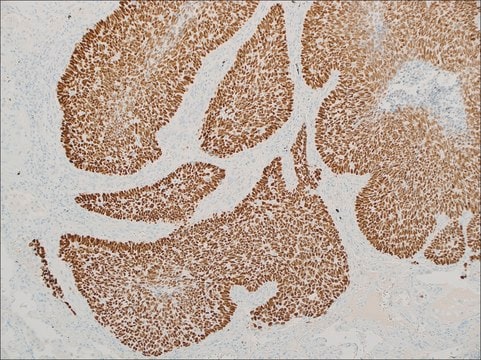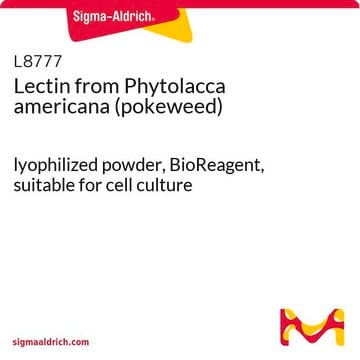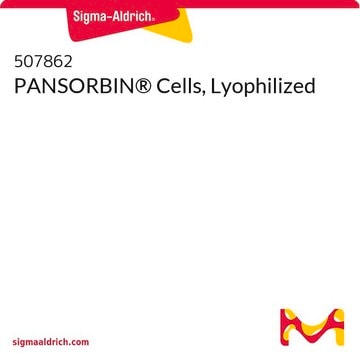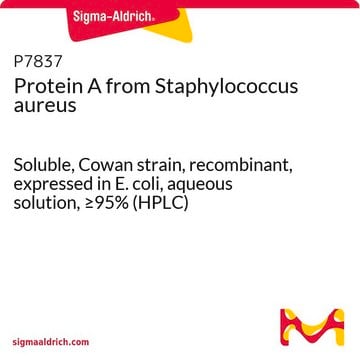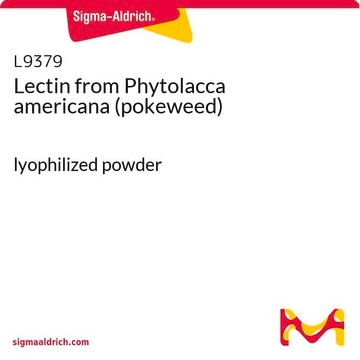507858
PANSORBIN® Cells
Sinónimos:
Staphylococcus aureus Cells
Iniciar sesiónpara Ver la Fijación de precios por contrato y de la organización
About This Item
UNSPSC Code:
41116133
NACRES:
NA.42
Productos recomendados
form
suspension (Homogeneous)
Quality Level
manufacturer/tradename
Calbiochem®
storage condition
do not freeze
impurities
≤2500 cells/mL Viable cells
color
milky
capacity
≥2.0 mg(human IgG/100 mg cells)
shipped in
ambient
storage temp.
2-8°C
General description
PANSORBIN Cells are heat-killed, formalin-fixed Staphylococcus aureus cells that have a coat of protein A and have been pickled by the method of Kessler. Useful for mitogenic stimulation of B lyphocytes and for immunoprecipitation.
Heat-killed, formalin-fixed Staphylococcus aureus cells (Cowan I strain) that bear a high cell-surface density of protein A and have been pickled by the method of Kessler. Useful as a solid-phase IgG-binding reagent due to the high affinity interaction of protein A with the Fc domain of IgG. PANSORBIN cells work best when the antibody is human (IgG1, IgG2, IgG4), rabbit IgG (all isotypes), or mouse (IgG2a, IgG2b, IgG3). Most common applications include immunoprecipitation and mitogenic stimulation of B lymphocytes.
Warning
Toxicity: Standard Handling (A)
Physical form
Supplied as a 10% suspension of Staphylococcus aureus cells in PBS, 0.1% NaN₃, pH 7.2.
Other Notes
Kierszenbaum, F., et al. 1991. Immunology74, 317.
Meikle, P.J., et al. 1991. J. Biol. Chem.266, 22569.
Ezaki, O., et al. 1989. Biochem. Biophys. Res. Commun. 159, 1368.
Murakami, H., et al. 1988. Biochem. J.256, 917.
Kessler, S.W. 1975. J. Immunol. 115, 1617.
Meikle, P.J., et al. 1991. J. Biol. Chem.266, 22569.
Ezaki, O., et al. 1989. Biochem. Biophys. Res. Commun. 159, 1368.
Murakami, H., et al. 1988. Biochem. J.256, 917.
Kessler, S.W. 1975. J. Immunol. 115, 1617.
Legal Information
CALBIOCHEM is a registered trademark of Merck KGaA, Darmstadt, Germany
PANSORBIN is a registered trademark of Merck KGaA, Darmstadt, Germany
signalword
Warning
hcodes
Hazard Classifications
Acute Tox. 4 Oral
Storage Class
12 - Non Combustible Liquids
wgk_germany
WGK 3
flash_point_f
Not applicable
flash_point_c
Not applicable
Certificados de análisis (COA)
Busque Certificados de análisis (COA) introduciendo el número de lote del producto. Los números de lote se encuentran en la etiqueta del producto después de las palabras «Lot» o «Batch»
¿Ya tiene este producto?
Encuentre la documentación para los productos que ha comprado recientemente en la Biblioteca de documentos.
Los clientes también vieron
Derek Walsh et al.
Genes & development, 20(4), 461-472 (2006-02-17)
Recruitment of the 40S ribosome to the 5' end of a eukaryotic mRNA requires assembly of translation initiation factors eIF4E, the cap-binding protein, together with eIF4A and eIF4G into a complex termed eIF4F. While the translational repressor 4E-BP1 regulates binding
J R Faust et al.
Proceedings of the National Academy of Sciences of the United States of America, 79(17), 5205-5209 (1982-09-01)
UT-1 cells are a clone of Chinese hamster ovary cells that were selected to grow in the presence of compactin, a competitive inhibitor of 3-hydroxy-3-methylglutaryl-coenzyme A reductase [mevalonate: NADP+ oxidoreductase (CoA-acylating), EC 1.1.1.34]. These cells have 100- to 1,000-fold more
Ruijin Shao et al.
American journal of physiology. Endocrinology and metabolism, 292(2), E604-E614 (2006-10-19)
Female mice lacking AR display alterations in ovarian and uterine function. However, the biology of AR in the fallopian tube is not fully understood. To gain an insight into potential roles of AR in this tissue, we demonstrated that eCG
T A Bunch et al.
Nucleic acids research, 17(23), 9761-9782 (1989-12-11)
Genes producing antisense RNA are becoming important tools for the selective inhibition of gene expression. Experiments in different biological systems, targeting different mRNAs have yielded diverse results with respect to the success of the technique and its mechanism of action.
N E Reiner et al.
The Journal of clinical investigation, 85(6), 1914-1924 (1990-06-01)
Cytokines produced by mononuclear cells are important regulatory and effector molecules and evidence has been presented to support a role at least for tumor necrosis factor-alpha (TNF-alpha) and interferon-gamma (IFN-gamma) in host defense against Leishmania. In the present study, we
Nuestro equipo de científicos tiene experiencia en todas las áreas de investigación: Ciencias de la vida, Ciencia de los materiales, Síntesis química, Cromatografía, Analítica y muchas otras.
Póngase en contacto con el Servicio técnico